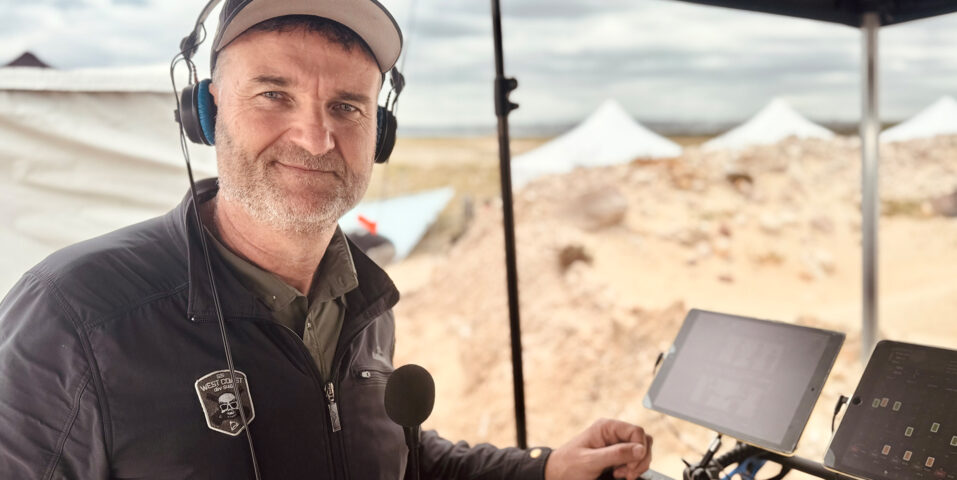In the world of film and television, location sound is one of the most quietly powerful elements of a screen production. From bustling city streets to remote outback landscapes, location sound recordists ensure what we hear on screen feels authentic, immersive and emotionally resonant, capturing dialogue, ambient sound and sonic texture all in real time. Their work blends technical precision with creative instinct, often in unpredictable environments; success requires not only gear knowledge but also a deep understanding of storytelling and collaboration.
James Nowiczewski, seasoned location sound recordist, sound supervisor and AFTRS tutor, embodies this balance with over 35 years of experience across a variety of productions. His career spans everything from feature films such as Furiosa, Elvis and the upcoming Spaceballs 2, to reality TV series including Australian Survivor, The Amazing Race and Better Homes & Gardens. A respected figure in the sound community, James is the founder and moderator of Australia’s largest production sound forum, a committee member of the Australian Screen Sound Guild and a published writer for international sound magazines.
Ahead of delivering the AFTRS Advanced: Location Sound Skills short course, James reflects on some of his most memorable and exciting projects, the evolution of sound technology and the “core principles” that still define location sound today.
What have been some of your favourite projects to work on as a location sound recordist and sound supervisor? What do you enjoy most about working in location sound?
“It’s hard to pick a favourite because I genuinely love every day on set – whether it’s a major feature film or a quiet interview in someone’s backyard. For me, it’s often about the people and the locations. Meeting and recording Bob Hawke for a documentary series was a real privilege. Working on the stunts in Furiosa was unforgettable, and Heartbreak High was just pure joy from start to finish.
What I enjoy most is being right there in the middle of it all – capturing authentic performances and moments as they happen. It’s such a unique mix of creativity, problem solving and teamwork. I still feel lucky every time I plug in a mic.”
How has location sound changed over your 35-year career and what skills are still as important today?
“The change has been massive. When I started, it was a couple of mics hardwired into a Nagra tape recorder. Now I’m running multitrack RF systems, complex timecode networks and feeding half a dozen departments simultaneously. The tech has evolved beyond imagination, but the core principles haven’t changed a bit. The closer we can get a microphone to the source, the better it will sound; that fundamental truth of sound never changes. You still need good ears, clear communication, the ability to stay calm under pressure and to read a room, both acoustically and emotionally.”
Who is the AFTRS Advanced: Location Sound Skills course for? What previous experience translates well for someone looking to upskill or transition into a location sound role?
“This course is ideal for anyone who’s had some on-set experience and feels drawn to the sound department as a career path. It’s also great for experienced film professionals – camera, post or even live sound operators – who want to cross-skill and understand how location sound really works. If you already know the rhythm of a set, have a bit of technical curiosity and enjoy solving creative challenges under pressure, you’ll fit right in.”
What is the one thing students can expect to take away from the course?
“Students will walk away with hands-on practical knowledge they can use straight away. It’s not just theory, it’s a working foundation for building a real career in location sound. They’ll leave knowing how to approach a set with confidence, communicate effectively with a crew, and deliver professional-quality sound in real-world conditions.”
James will be delivering AFTRS Advanced: Location Sound Skills, a two-day short course designed to expand your audio skills for screen projects. Combining theory, demonstration and hands-on practice, this course offers the opportunity to learn with industry-standard equipment both on set and on location, building critical skills in booming, wiring, mixing and recording. You can enrol for December’s course here.
This course is part of our AFTRS Advanced series – limited-run courses designed by industry for industry, offering screen and audio practitioners specialised skills, knowledge and insights to advance their careers and creative pursuits in more niche areas through premium training.
